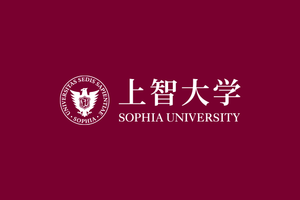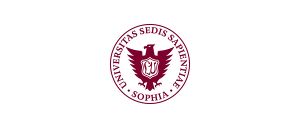School:Sophia University
Contents
- 1 A General Overview of Sophia University
- 2 Promoting Student Innovation and Entrepreneurship
- 3 Encouraging Faculty Innovation and Entrepreneurship
- 4 Actively Supporting the University Technology Transfer Function
- 5 Facilitating university-industry collaboration
- 6 Engaging with Regional and Local Economic Development Efforts
A General Overview of Sophia University
Sophia University (Jouchi Daigaku 上智大学) is one of the most prominent private universities in Japan. Founded in 1913 by the Roman Catholic religious order of the Society of Jesus, it has grown from its three original departments of Philosophy, German Literature, and Commerce to nine undergraduate faculties and ten graduate schools, with over 13,900 students in total.
While physically located in the heart of Tokyo, right across the Imperial Palace, Sophia University is also close to the socio-economic and political core of Japanese society. From its early days, the University has been a center for internationalization and to this day continues to act as a bridge to the wider world. Many of its graduates find their way into fields such as the media (national broadcasters like NHK), global development (international organizations like the United Nations), or global business (multinational corporations).
Promoting Student Innovation and Entrepreneurship
Sophia University is continuously developing as a higher education institution. In recent years, it has shifted away from a classical discipline-based institution to one that aims to be more innovative and student-centered. An example is the Faculty of Liberal Arts (FLA), which offers English-taught undergraduate degrees. This faculty has increased interactions between Japanese and international students, and many of its professors have been at the university’s forefront in adopting innovative teaching methods.
Recently, Sophia University has been increasingly focused on the environment and sustainable development. Many of its programs have conscientiously incorporated courses related to the Sustainable Development Goals or SDGs (a set of global goals adopted by the United Nations in 2015). As a prominent institution for research and higher education in the fields of social sciences, humanities, and natural sciences, Sophia University was one among 37 Japanese universities to be selected for the “Top Global University Project” – a funding project initiated by the Japanese Ministry of Education, Culture, Sports, Science and Technology to support the innovation and internationalization efforts of universities. Based on this project, Sophia University launched a new English-based undergraduate program called “Sophia Program for Sustainable Futures” (SPSF) in the fall of 2020. This program brings together seven different disciplines (journalism, education, sociology, economics, management, international relations, and area studies) and is designed to foster interdisciplinary and action-oriented learning.
Another English-taught degree program known as the Faculty of Science and Technology aims to educate future scientists and technologists to become productive members of the global community. Students at the Faculty of Science and Technology seek a deeper understanding of human development and harmonious coexistence with people and nature.
In addition to these curricular programs, there have been interactive events for students to engage with and spark innovation. United Nations Week and Mirai 2.0 Research and Innovation Week are a few annual events that allow active learning through the collaboration of industries and academic institutions.
Overall, the university’s core values of respect for equality, diversity, and contribution to the larger social good are captured into its motto: “Men and Women, With Others, For Others.” These values permeate not only its academic curriculum but also guide students in their extracurricular activities. Students undertake many volunteer activities run inside and outside the university, but also beyond Japan, such as the support activities focused on refugees, or the areas damaged by the Great Tohoku Earthquake, to name a few. Extracurricular clubs that promote innovation, entrepreneurship, and creativity include Horizon (a student empowerment organization committed to inspiring youth to create innovative solutions for social change) and Sophia Start-up Club (Sophia University’s first entrepreneurship organization established in 2021). Other programs that generate awareness and fundamental elements of I&E include TEDxSophia, Sophia University Future Center, Yotsuya Hatch (a start-up pitch event organized by Sophia Start-up Club), and Hult Prize OnCampus Program (an annual global competition for pitching business ideas that tackle various social issues).
Encouraging Faculty Innovation and Entrepreneurship
Responding to the need to further develop as a “university in line with the world,” Sophia University has been taking bold steps in rethinking the old approach to teaching and learning. Through various initiatives, it has sought to reform “towards a qualitative change in university education to build a new future” for Japanese society and foster a “knowledge-based independence, collaboration, and creative model” which “cultivates independent thinking and creativity” (Report of the Central Equation Council, August 2012).
However, while Sophia University has focused on working in the areas of innovation in recent years, the institution lacks resources for promoting entrepreneurship. There continue to be limitations, such as not having offices, faculties, or organizations that are specifically focused on encouraging students to explore I&E. Sophia University hopes to improve on these areas in the near future through new programs such as SPSF.
Actively Supporting the University Technology Transfer Function
Sophia University is active in funding and supporting research programs through the Sophia Research Support Organization. The Organization has been exploring the possibility of further expanding its research support system and providing enhanced support for faculty to commercialize their research. It aims to act as an incubator that would facilitate successful technology transfers, licensing, and innovation projects. In this way, Sophia University is working to advance development projects through collaboration between industry, government, and academia.
In addition, Sophia University has several seed funding sources for students’ activities. For extracurricular activities, Sophia University provides grant support each semester for the University’s official extracurricular activities. Students go through the process of examination by submitting a proposal and having an interview to receive the grant and report the usage and the impact of the project. Likewise, despite not being a group specifically at Sophia University, many of its students actively utilize a social incubator for movements and change-makers called Social Innovation Japan where they can join its community to get information and opportunities regarding topics they are passionate about.
In 2021, Sophia University joined the Renewable Energy University League of Japan. The universities that join this community aim to transition their campuses to 100% renewable energy between 2030 and 2040. In November 2022, after an electricity supplier switch at some buildings, 100% of the electricity consumed at Sophia University's Yotsuya Campus have become to come from renewable energy. In addition, the university is trying to encourage its students to also take action for renewable energy and decarbonization through various initiatives and campaigns on the campus.
Facilitating university-industry collaboration
Recognizing that Japan’s industry-academia collaboration is poor compared to Western countries, Sophia University's Faculty of Science and Engineering created the “Sophia Science & Technology Liaison Office” in November of 2001 to transfer research breakthroughs more easily into society. Unfortunately, this organization is no longer in operation within the University, but its impacts have left a strong impression on the I&E community and students involved in its mission.
Another way Sophia University emphasizes industry-academia collaboration is through the Bulletin Board of Information found in the student portal. The University posts about scholarship opportunities and programs involving university-business collaborations. Some of these scholarships and programs offer students opportunities to engage with industries and learn I&E skills by working directly with them. Not only are students given a chance to expand their range of experiences by applying to these activities, but they are also able to build their own networks for their future careers. On the other hand, some of the posts within the Bulletin Board of Information are related to research labs and research funding. Sophia University highly values quality research and the involvement of students in developing new technologies and thus often offers these openings to its entire student body.
Although Sophia University’s history with innovation and entrepreneurship (I&E) is short, the institution’s efforts such as opening new programs and opportunities for innovation to faculty and students have become more apparent in the past few years. Over time, a growing number of faculty members have become active in organizing events and activities where they encourage students to incorporate entrepreneurial skills and mindsets.
Engaging with Regional and Local Economic Development Efforts
Sophia University has been promoting educational and research activities based on a spirit of charity and globalism through encounters and dialogues with people of diverse backgrounds in the hope to bring forth solutions to the many problems that torment our world today. Through its participation in the Inter-University Exchange Project called the “Collaborative Online International Learning,” Sophia University offers programs towards Human Security and Multicultural Coexistence which allow students in Japan to connect and learn together with other students at institutions in Japan and abroad.
In November 2015, the University signed the Principles for Responsible Investment (PRI) supported by the United Nations with the aim to realize a sustainable society. These principles advocate for the incorporation of environmental, societal, and corporate governance concerns into investment decisions. As a private corporation that operates education and research institutes, and as a responsible asset owner, Sophia University assumes its responsibility and contributes to solving the various issues facing our global society through its ESG investment.
In addition to that, the Sophia School Corporation has established a new ‘green’ building on campus to be used for various purposes, including community events and academic gatherings for working professionals. The three-story wooden building consists of a café on the first floor and classrooms on the rest of the floors. The Corporation also plans to establish a disaster prevention warehouse that is accessible to the public.
To conclude, Sophia University is located at the center of one of the busiest metropolitan areas in the world. It also gathers together the best and the brightest domestic and international students and faculty, giving it unique advantages and opportunities. Maximizing them will continue to require innovative and creative thinking. This is where the mindset and skills of the UIF Community can potentially make a meaningful contribution.
Related links

